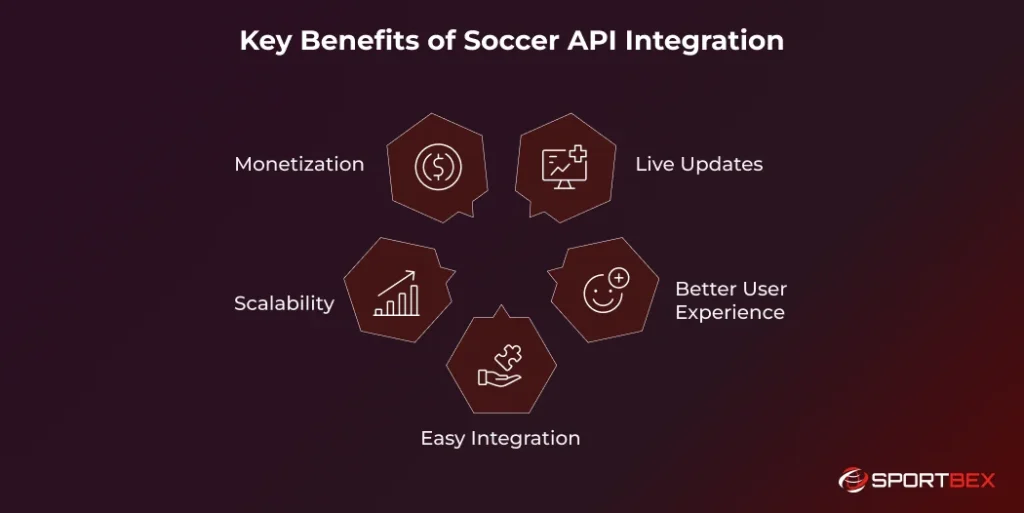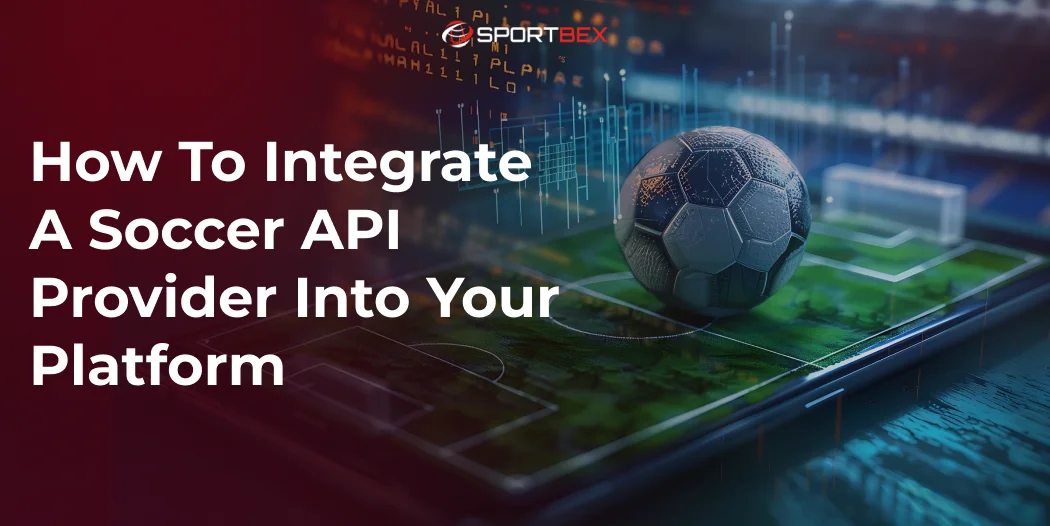Building a successful soccer-focused platform requires access to real-time data, comprehensive statistics, and seamless user experiences. Whether you’re developing a fantasy sports app, live score website, or betting platform, integrating a reliable soccer API provider is essential for delivering the dynamic content your users expect.
Modern soccer platforms powered by a live soccer API must handle everything from live match updates and player statistics to odds calculations and historical data analysis.
You’ll discover how to select the perfect provider for your needs, navigate the technical integration process, and leverage API data to create compelling user experiences that drive engagement and growth. This guide will help you understand how to integrate a Soccer API provider into your platform effectively and maximize its potential.
By the end of this post, you’ll have the knowledge and tools needed to successfully integrate soccer data into your platform, regardless of your technical background or project scope.
What Is a Soccer API Provider?
A soccer API provider delivers structured soccer data through Application Programming Interfaces (APIs), enabling developers to access real-time match information, player statistics, team data, and historical records without building these systems from scratch.
These providers aggregate data from multiple sources worldwide, including official league databases, sports data companies, and verified news outlets. The information gets processed, standardized, and delivered through RESTful API endpoints that applications can query programmatically.
The API structure allows platforms to request specific data sets based on their requirements. For example, a fantasy football app might primarily use player statistics and injury updates, while a betting platform focuses on odds data and live match events.
Why Use a Soccer API in Your Platform?
Integrating an api soccer solution transforms static platforms into dynamic, engaging experiences that keep users returning. Rather than manually updating content or relying on delayed information, APIs provide automated data flows that ensure your platform stays current with the fast-paced world of soccer.
Data accuracy and reliability represent fundamental advantages. Professional API providers maintain dedicated teams that verify information accuracy, handle data corrections, and ensure consistent formatting across different leagues and competitions.
Global coverage expands your platform’s reach beyond local leagues. Top soccer API providers cover hundreds of leagues worldwide, from major competitions like the Premier League and Champions League to regional tournaments.
Key Benefits of Soccer API Integration

Live Updates
Real-time data delivery keeps your platform synchronized with ongoing matches, delivering goal notifications, card updates, and substitution information within seconds of occurrence. This immediacy creates engaging user experiences that rival official broadcaster platforms.
Soccer live score API integration enables instant score updates across multiple matches simultaneously, allowing users to follow numerous games without switching between applications. Advanced implementations using a live soccer API from trusted Sports API providers can also trigger push notifications based on user preferences, team selections, or betting interests.
Better User Experience
API integration enables personalized content delivery based on user preferences, location, and engagement history. Users can follow specific teams, leagues, or players, receiving customized updates and relevant information that matches their interests.
Interactive features become possible through rich data availability. Platforms can offer live polls during matches, prediction games, social sharing of key moments, and community discussions around real-time events.
Easy Integration
Modern soccer APIs prioritize developer experience through comprehensive documentation, code examples, and testing environments. RESTful architecture ensures compatibility with virtually any programming language or framework.
Authentication typically uses simple API key systems that can be implemented in minutes. Many providers offer SDKs for popular programming languages, further simplifying the integration process.
Scalability
Cloud-based API infrastructure automatically scales to handle traffic spikes during major matches or tournaments. Your platform benefits from enterprise-level infrastructure without managing servers or databases directly.
Major league soccer api providers typically offer multiple service tiers that can grow with your platform. Start with basic features and upgrade to advanced analytics, additional leagues, or higher request limits as your user base expands.
Monetization
Rich data enables diverse revenue streams through advertising, premium subscriptions, and affiliate partnerships. Detailed match statistics support fantasy sports integration, while odds data facilitates betting platform development.
User engagement metrics improve when platforms offer comprehensive, up-to-date information. Higher engagement translates to increased ad revenue, subscription conversions, and user retention rates.
Real-World Use Cases of Soccer API Integration

Fantasy Sports Apps
Api fantasy football platforms rely heavily on player performance data, injury updates, and match statistics to calculate scoring and maintain competitive leagues. Real-time integration ensures accurate point calculations and immediate leaderboard updates.
Popular features include automated lineup suggestions based on player form, injury risk assessments, and matchup analysis. Advanced platforms use historical data to generate player projections and optimize draft strategies.
Integration with live soccer api feeds enables in-match scoring updates, allowing fantasy players to track their team’s performance in real-time. This immediate feedback increases engagement and encourages more active participation.
Live Score Websites
Comprehensive score tracking requires simultaneous data feeds from multiple leagues and competitions worldwide. Soccer odds api integration adds betting context that many users find valuable for match analysis.
Live score platforms typically implement sophisticated caching systems to handle high traffic volumes during popular matches. APIs provide the foundation for these systems while ensuring data accuracy across all users, making it easier to create a soccer leaderboard that updates in real time with every match event.
Advanced implementations include live commentary generation, match timelines, and historical comparison features. These value-added services differentiate platforms in the competitive live score market.
Betting Platforms
Soccer odds api integration provides the foundation for modern sports betting platforms, delivering real-time odds updates, line movements, and market availability across multiple bookmakers.
Live betting features require extremely fast data updates to manage risk and provide accurate odds during matches. Professional APIs deliver updates within seconds of match events, enabling sophisticated in-play betting options.
Historical data supports advanced analytics features like trend analysis, team performance comparisons, and predictive modeling. These tools help both operators and bettors make more informed decisions.
Sports News Sites
Automated content generation becomes possible through comprehensive API data, enabling news sites to publish match reports, player profiles, and statistical analyses without manual writing.
Breaking news alerts can be triggered automatically based on significant match events, transfer announcements, or injury updates. This automation ensures timely coverage of important developments.
Women’s Champions League coverage and other specialized competitions benefit from API integration, providing consistent data quality across all league levels and gender categories.
Get Your Soccer Data Here
Live scores, player stats, and team data from one simple API.
Step-by-Step Guide to Integrate a Soccer API Provider
Step 1: Choose the Right API Provider
Evaluate potential Soccer api providers based on data coverage, update frequency, pricing structure, and technical support quality. Consider your platform’s specific needs, the target audience’s geographic location, and the required data types.
Research key factors, including:
- League and competition coverage scope
- Data update frequency and reliability
- API response time and uptime guarantees
Request trial access or free tier accounts to test data quality, API performance, and integration complexity before committing to paid plans. Many providers offer sandbox environments for development testing.
Step 2: Create an API Account and Get an Access Key
Register for developer accounts with your chosen provider, providing accurate business information and intended use case details. Some providers require application approval processes that can take several days.
Account setup typically includes:
- Business verification and contact information
- Platform description and expected usage volumes
- Payment method configuration for paid tiers
Store API credentials securely using environment variables or dedicated credential management systems. Never expose API keys in client-side code or public repositories.
Step 3: Understand the API Endpoints
Study the API documentation thoroughly to understand available endpoints, required parameters, response formats, and error handling procedures. Professional APIs typically organize endpoints by functionality like matches, teams, players, and leagues.
Common endpoint categories include:
- Live matches and scores
- Team information and rosters
- Player statistics and profiles
Test individual endpoints using tools like Postman or curl commands to understand response structures and identify the data fields most relevant to your platform.
Step 4: Set Up Your Backend to Fetch & Display Data
Implement API integration in your backend systems using appropriate HTTP client libraries for your programming language. Design your data architecture to efficiently store, cache, and serve API responses to your frontend applications.
Backend implementation considerations:
- Asynchronous API calls to prevent blocking operations
- Response caching to minimize API requests and improve performance
- Error handling for network failures and rate limiting
Create abstraction layers that isolate API integration code from your main application logic. This approach simplifies future provider changes and enables easier testing and maintenance.
Step 6: Monitor Performance and Errors
Implement comprehensive monitoring systems that track API performance, error rates, and business metrics related to data integration. Set up automated alerts for critical issues like API downtime or excessive error rates.
Key monitoring metrics include:
- API response times and availability
- Error rates and types
- Data freshness and accuracy
Create dashboards that visualize API performance trends over time. This visibility helps identify optimization opportunities and plan for capacity scaling.
Why Should You Choose Sportbex Sports Soccer API?
Sportbex Sports Soccer API stands out in the competitive landscape through comprehensive global coverage, lightning-fast updates, and developer-focused integration tools. The platform covers leagues worldwide, ensuring your application can serve diverse international audiences with relevant, localized content.
Real-time performance sets Sportbex apart with sub-second update delivery during live matches. Whether you’re building a football prediction app or managing complex soccer statistics api integrations, this speed ensures your users receive information as quickly as official broadcasters.
Developer experience prioritizes ease of integration through comprehensive documentation, interactive API explorers, and responsive technical support. Code examples in multiple programming languages reduce integration time and minimize development complexity.
Conclusion
Integrating a professional soccer API provider transforms your platform from a static information source into a dynamic, engaging destination that users visit repeatedly. The combination of real-time updates, comprehensive coverage, and reliable performance creates the foundation for successful sports applications.
Whether you’re building the next great fantasy sports platform, creating an innovative streaming service for live sports experiences, or developing comprehensive soccer statistics tools, professional API integration provides the competitive advantage necessary for success.
Success depends on choosing the right provider for your specific needs, implementing robust monitoring and error handling, and designing scalable architectures that can grow with your platform.
All Your Soccer Data in One Place
Build your platform on reliable data with our 99.9% uptime guarantee
Frequently Asked Questions
A Soccer API provider offers real-time data feeds for soccer matches, including live scores, player stats, fixtures, and results. These APIs help developers integrate accurate football data into apps and websites.
Using a Soccer API provider ensures instant access to reliable soccer data, saving time and reducing development costs. It helps apps deliver live updates, match insights, and betting odds efficiently.
Look for real-time score updates, comprehensive league coverage, player and team statistics, odds data, and easy API integration. Reliable documentation and uptime are also essential.
To integrate a Soccer API, register with a trusted provider, get your API key, and use RESTful endpoints to fetch and display live soccer data. Most APIs support JSON or XML formats for easy setup.
Soccer API providers benefit sports betting platforms, fantasy football apps, sports media sites, and analytics tools that rely on real-time soccer data and match statistics.
Recent Blog
How NBA Odds APIs Deliver Real-Time Betting Data for Sportsbooks
February 26, 2026
Tracking Tennis Odds Live Using Real-Time Betting APIs
February 26, 2026



